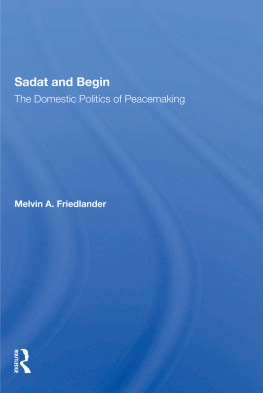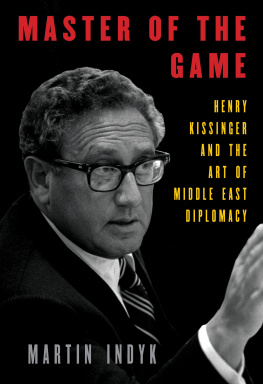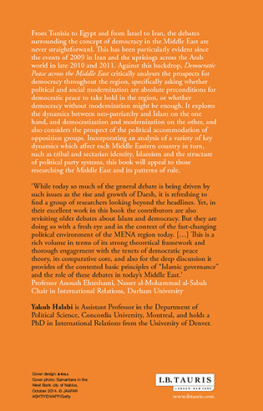Routledge Revivals
Negotiating for Peace in the Middle East
Ismail Fahmy was Minister of Foreign Affairs and Deputy Premier of Egypt, but resigned in protest against President Sadats visit to Jerusalem in 1977. This book, published in 1983, presents the first portrait of Sadat from within the Arab ruling elite, and gives unique coverage of the crucial negotiations that took place between Arab leaders, which determined the key events during this period. Fahmy vividly recounts the years when prospects for a permanent peace in the Middle East seemed a real possibility and presents a damning portrayal of the roles that Kissinger, Nixon and Carter played in events. This is a fascinating account of the struggle for peace in the Middle East, written from the unique perspective of a written from the unique perspective of a contemporary at the heart of the dialogue.
Negotiating for Peace in the Middle East
Ismail Fahmy
First published in 1983
by Croom Helm Ltd
This edition first published in 2013 by Routledge
2 Park Square, Milton Park, Abingdon, Oxon, OX14 4RN
Simultaneously published in the USA and Canada
by Routledge
711 Third Avenue, New York, NY 10017
Routledge is an imprint of the Taylor & Francis Group, an informa business
1983 Ismail Fahmy
All rights reserved. No part of this book may be reprinted or reproduced or utilised in any form or by any electronic, mechanical, or other means, now known or hereafter invented, including photocopying and recording, or in any information storage or retrieval system, without permission in writing from the publishers.
Publishers Note
The publisher has gone to great lengths to ensure the quality of this reprint but points out that some imperfections in the original copies may be apparent.
Disclaimer
The publisher has made every effort to trace copyright holders and welcomes correspondence from those they have been unable to contact.
A Library of Congress record exists under LC control number: 82049057
ISBN 13: 978-0-415-83112-3 (hbk)
ISBN 13: 978-0-203-79636-8 (ebk)
NEGOTIATING FOR PEACE IN THE MIDDLE EAST
Negotiating for Peace
in the Middle East
ISMAIL FAHMY
1983 Ismail Fahmy
Croom Helm Ltd, Provident House, Burrell Row,
Beckenham, Kent BR3 1AT
British Library Cataloguing in Publication Data
Fahmy, Ismail
Negotiating for peace in the Middle East.
1. Peace 2. Near East History1945
I. Title
956.04 DS61.8
ISBN 0-7099-1033-9
Typeset by Leaper & Gard Limited
Printed and bound in Great Britain
Billing & Sons Ltd, Worcester
To the Egyptian people.
ACKNOWLEDGEMENTS
It has been my privilege and burden to be a participant in all the events discussed in this book. My problem thus has not been to find out what happened, but to sort out and organize my recollections so as to let the reader gain an insight into the important historical events of the period.
Memoirs are intensely personal, and the author can only receive limited help, but I was fortunate in having all the support I could hope for. My wife Afaf lived with me all the historical events contained in this book. She not only inspired me on many occasions but also provided the peaceful domestic atmosphere in which I could work undisturbed. My daughter Randa spent long months transferring on to paper what had just been ideas in her fathers head. My sons Hamed and Nabil provided many suggestions and constant critical comment: their day-to-day interest in my project greatly encouraged me to see it through to the end. Marina Ottaway arrived in the final stage to assist me in editing the manuscript and certainly she arrived at the proper moment. Yasmine Abdool, my Mauritian secretary, took dictation and typed innumerable drafts of the manuscript with unfailing patience, and she valiantly struggled to finish the final copy in the days immediately preceding and following the birth of her son, Muhammad Ali. To all of them I want to express my most heart-felt thanks.
Cairo, June 1982
Many Egyptian, Arab and foreign friends have expressed interest in reading my story concerning Sadats decision to fly to Jerusalem on 19 November 1977. They argue that this was a major historical event and that, as Deputy Prime Minister and Foreign Minister of Egypt up to 17 November 1977, I was under special obligation to break the silence I had voluntarily imposed on myself. The story of what really happened between Sadat and myself prior to his final decision to go to Jerusalem has to be told. They continue to argue that, while it is true that Sadats visit was acclaimed world-wide, on the other hand there remain many major questions and serious doubts as to the wisdom of the initiative itself.
How did Sadat decide to get to Jerusalem? Why did he keep the decision secret? Why did the Egyptian President not consult his own government? Was he sure of unanimous rejection by his own cabinet and the countrys institutions? Why did Sadat choose not to consult anyone in Egypt except his Foreign Minister, as he personally admitted? What were the reasons behind President Sadats decision to keep his friend President Carter ignorant about the bilateral contacts which took place between Egypt and Israel in Rabat in September 1977 and particularly concerning Sadats final decision to visit Jerusalem? It certainly seems strange that, if President Sadat really believed that the solution to the Middle East crisis lay in the hands of the United States alone, he would hide such a major initiative from President Carter. Was Sadats secrecy his own decision or did the Israelis persuade him to keep quiet?
I have now decided to write about these events because I am increasingly concerned about the many statements made and the many articles and books published on this matter. My final decision to go ahead was triggered by the incorrect versions of events presented in books such as Ezer Weizmans The Battle for Peace, Moshe Dayans Breakthrough, The Year of the Dove, written by three Israelii journalists, and above all Sadats own In Search of Identity.
For obvious reasons, everyone has claimed that their story was the correct version. The discrepancies in the accounts are natural because those who have written or are writing about Sadats trip to Jerusalem differ greatly in terms of their access to information. In fact they can be divided into two groups: firstly there are a very few senior government officials like Dayan who were well informed of what was taking place by virtue of their official position. The second group comprises those journalists who did not have any direct access to primary sources; their stories were compiled on the basis of second-hand or even third-hand information to which they added bits and pieces from their imagination. Neither Sadat nor Begin, the main actors in the drama, have shed any serious light on events. Begin until now has been almost silent. Sadat, on the other hand, has given several different explanations of how, why and when he took the decision to visit Jerusalem. The explanation of these contradictions resides in Sadats own personality and the complexity of the events and circumstances he faced in Egypt and the Arab world.








![Kissinger - Years of Upheaval: [VOL2 Classic Memoirs]](/uploads/posts/book/181244/thumbs/kissinger-years-of-upheaval-vol2-classic.jpg)



